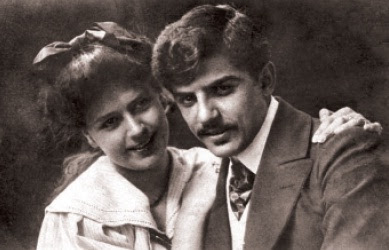I read that today, April 19, is the birthday of Arayik Khandoyan. He remains etched in my memory wearing iconic Che Guevara cap. I am also reminded of his and his four brothers’ soft spoken mother. All her children served armed forces except one because he was handicapped, Attached is the Google translation of the Arayik Khantoyan Wikipedia post that awaits translation into English. Բնագիրը ՝ https://hy.wikipedia.org/wiki/%D4%B1%D6%80%D5%A1%D5%B5%D5%AB%D5%AF_%D4%BD%D5%A1%D5%B6%D5%A4%D5%B8%D5%B5%D5%A1%D5%B6
ARAYIK KHANTOYAN
Arayik Yezniki (Hendo) Khandoyan (nickname: Lone Wolf) (April 19, 1971, Verin Sasunik, Armenia - October 9, 2018, Gyumri, Armenia), freedom fighter who participated in the First Artsakh War, major of the reserve forces of the RA Armed Forces, public and political figure, Member of "Constituent Parliament" organization and "Sasna Tsrer" group [1].
EARLY LIFE
Arayik Khandoyan was born in 1971. on April 19, in the village of Tsaghkahovit, Aragatsotn region, in the family of Hendo (passport name: Yeznik) and Rima Khandoyan.
MILITARY ACTIVITY
Arayik Khandoyan's military career began in 1988, when he, being still 17 years old, was procuring weapons and ammunition from the nearby Soviet military base in the village of Tsaghkahovit in order to provide them to the Armenian volunteer squads.
In 1989, he was conscripted into the armed forces of the USSR, but in 1990, he did not return to the place of service.
The reason for desertion from the Soviet army was the escalation of the Artsakh war. In the same year, Arayik Khandoyan went to Artsakh and joined the volunteer self-defense movement, where he got the nickname "Lone Wolf". Three of his brothers, Ararat, Arthur and Hunan, also participated in the Artsakh war. Armen Khandoyan could not participate in the war due to health problems.
Hunan Khandoyan died during the war.
In 1994 After the ceasefire, Arayik Khandoyan and his brothers Ararat and Arthur continued their service in the RA Armed Forces.
FAMILY
Arayik Khandoyan's family is large. Parents are Hendo and Rima Khandoyan. He had 4 brothers (Armen, Ararat, Arthur, Hunan), three of whom participated in the Artsakh movement and the Artsakh war together with him. Due to illness, the middle brother, Armen, could not participate in the war. Arayik Khandoyan has 5 children.
 |
| Mother of Armen, Ararat, Arthur, Hunan, Arayik Khantoyan |
POLITICAL ACTIVITY
In order to overcome the serious socio-economic, demographic and political problems prevailing in Armenia and Artsakh, and to preserve the integrity of the Republic of Artsakh, he made many political appeals. He then joined the movement founded by the commander of Shushi's special battalion, who participated in the Artsakh war, Jirayr Sefilyan. He is a member of the Constituent Parliament organization. He gave speeches at rallies, participated in political marches, made appeals through press conferences.
Arayik Khandoyan had been persecuted many times, including arrest, for his political activism.
100TH ANNIVERSARY WITHOUT THE REGIME
Note: see main article: 100th anniversary without the regime.
Note: see main article: Berdzoryan incident (2015)
On January 31, 2015, Arayik Khandoyan, along with about 150 members of the "100th anniversary without the regime" initiative and their family members, were attacked and brutally assaulted by the police of the Republic of Artsakh masked special forces and people in civilian clothes in the Berdzor section of the Goris-Stepanakert highway and were beaten[2][3][4]. The representatives of the government who committed this crime remained unpunished until today.
STORMING THE YEREVAN POLICE STATION
Note: see the main article: Armed uprising in Yerevan (2016)
Arayik Khandoyan participated in the 2016 "Sasna Tsrer" group in the July 17 armed attack on the police regiment of Erebuni administrative district [1].
On July 31, 2016 when the group in the police station surrendered to the law enforcement officers, Arayik Khandoyan was arrested along with other members of the group. He, like the rest of the group, was charged with Article 218, Part 3, Clause 1 (hostage taking) and Article 235, Part 3 (acquiring, selling, storing, transporting illegal weapons) of the Criminal Code of the Republic of Armenia.[5] .
DETENTION
Arayik Khandoyan was arrested on July 31, 2016, after the surrender of the Sasna Tsrer group to the authorities[6]. He spent nearly two years in prison, he was regularly tortured. The June 28, 2017 incident was the extensively covered by the media, when 10-15 police officers brutally beat him in the basement of the Avan and Nor Nork court[7][8][9]. Khandoyan's defenders interpreted it as retaliation against him by order of the authorities.
Arayik Khandoyan's restraining order was changed on August 17, 2018, 3 months after the Velvet Revolution, and he was released.[10]
AWARDS
On March 11, 2015, Arayik Khandoyan, as a statement against the Armenian and Artsakh authorities, renounced his combat medals: Artsakh and RA "Valor" medals, "Combat Service" award, "Soldier Andranik", "Marshal Baghramyan" awards and others.[11][12].
But in 2018 after the popular revolution, all awards were returned.
DEATH
Araik Khandoyan died on October 9, 2018 from a heart attack[13].
FUNERAL
Arayik Khandoyan's funeral took place on October 14, in Yerablur pantheon [14]. The funeral was attended by Arayik Khandoyan's comrades-in-arms, party leaders, cultural and political figures. RA Prime Minister Nikol Pashinyan also sent his condolences to the relatives of Arayik Khandoyan.











